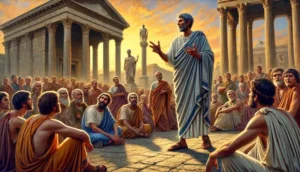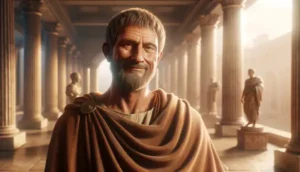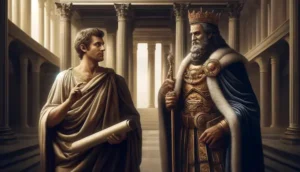One of the things that the stoics talk frequently in their works is the idea of death. It’s probably, for most of us weird, to even talk about it but the stoics had a clever way of putting death into perspective to deal with the difficulties of life, especially anxiety.
Here are 5 ways the ancient stoics view death:
- Death is a natural process.
“And what dying is—and that if you look at it in the abstract and break down your imaginary ideas of it by logical analysis, you realize that it’s nothing but a process of nature, which only children can be afraid of. (And not only a process of nature but a necessary one.)” Marcus Aurelius 2.12
Earth is finite. We only have a limited amount of food to eat and a land to live in. Imagine if no one of us die and given that we all need and a place to live, we will live in a chaotic world where we probably be killing each other to get this limited amount of resource. We have to die so someone could live.
- Death completes death-process.
“We die every day. For every day a little of our life is taken from us; even when we are growing, our life is on the wane. We lose our childhood, then our boyhood, and then our youth. Counting even yesterday, all past time is lost time; the very day which we are now spending is shared between ourselves and death. It is not the last drop that empties the water-clock, but all that which previously has flowed out; similarly, the final hour when we cease to exist does not of itself bring death; it merely of itself completes the death-process. We reach death at that moment, but we have been a long time on the way.” Seneca, Letters from a Stoic 24
Seneca has really a clever way of describing death as a process instead of thinking it as a one-time big time horrible event. It’s true. Without realizing it, the day we start to live is the day we start preparing for our death. We can no longer take back our youth, it’s no longer there. Every cell dies and the organs of our body is slightly less strong than it was yesterday. There is beauty in knowing that death is wear and tear because when finally the end, it shouldn’t surprise as that much.
- Emperors and all the great men die.
“Think of the multitudes of men doomed to death who will come after you, of the multitudes who will go with you! You would die more bravely, I suppose, in the company of many thousands; and yet there are many thousands, both of men and of animals, who at this very moment, while you are irresolute about death, are breathing their last, in their several ways.” Seneca Letters from A Stoic 77
We are all going to die. Alexander the great, Abraham Lincoln all of the great men before us die. What the stoics essentially say is that when you ponder about your own death or if you have loved ones that have passed away, think of the billions of people that have died before us and the millions of people that are going to die today. If you have that perspective that death is in every corner of the world , in every second someone’s gonna die , and can happen to anyone then don’t put so much weight on death putting so much thought about it.
- Death in the grand scheme of things.
“Remember:
Matter. How tiny your share of it.
Time. How brief and fleeting your allotment of it.
Fate. How small a role you play in it.” Marcus Aurelius
One of the things that the stoics are really good at is putting things in the context of everything. If we are to see ourselves 10000 km from the surface of the Earth, what do we look like? Nothing. Our life, including our death, are atoms in the grand scheme of things. What would seem like a heavy mountain in our shoulder shrinks to a particle of a sand when we extend our imagination
- Death makes us value time.
“You could leave right now. Let that determine what you do and say and think. “Marcus Aurelius, Meditations
Our time is like any finite resources – the more we have it, the less value it and vice versa. Take for example, money. The less we have it, the more we value every dollar of it. Mother Nature want to make sure we value our time and if we constantly remind ourselves that we could leave at any given time, we will make the most of the present moment, spend time with our loves one or do things we truly love. We will realize how insignificant it is to dwell in the past for our past mistake or constantly worry about what the future holds for us. As Marcus Aurelius puts it, “Even if you’re going to live three thousand more years, or ten times that, remember: you cannot lose another life than the one you’re living now, or live another one than the one you’re losing. The longest amounts to the same as the shortest. The present is the same for everyone; its loss is the same for everyone”
“Death smiles at us all, all we can do is smile back.”






